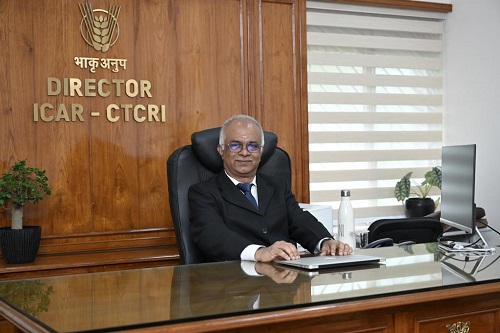Director's message
| Personal Information |
|
| Name |
Dr. G.Byju |
| Qualification |
Ph.D (Soil Science) |
| E-mail |
director.ctcri@icar.gov.in |
| Professional Information |
|
| Area of specialization |
Soil Science |
| Area of interest |
Site specific nutrient management (SSNM), Climate Change and abiotic stress mangement |
Tropical tuber crops (TTC) include cassava, sweet potato, yams, taro, tannia, elephant foot yam, arrowroot, Chinese potato and certain other starchy crops. Most of them are famine reserve crops due to their ability to withstand infertile soils, drought and heat, uncertain rainfall, coupled with probability to delay harvest of tubers until needed. Highly versatile crops, they are food for the household, feed for livestock and raw materials for a wide array of value-added products, from coarse flour to high-tech starch gels to alcohol to biofuel to bioplastics. Many of the world’s nature dependent and food insecure people are highly dependent on these crops as contributing, if not principal, sources of food, nutrition and family income. Though earlier considered as “food of the poor”, they have become multipurpose crops that respond to the priorities of developing countries, to trends in the global economy and to the challenges of climate change. They are candidate crops for ecosystem-based approach of production intensification that aims at greening the Green Revolution through farming practices that draw on nature’s contributions to crop growth, such as soil organic matter, organic and bio-fertilizers and bio-control of insect pests and diseases. The TTCs are important staples for over one billion people in the developing world and in India, they are sources of sustenance and livelihood security of about 200 million people across more than 20 different states and total value of output at current prices is Rs. 12500 crores.
ICAR-CTCRI, established in 1963 and celebrating its Diamond Jubilee during 2023, carries a lot of legacies of the past research achievements including improved varieties, production technologies and climate resilient cropping systems and ways to improve the livelihoods of farmers by strengthening the tuber crops value chain. The Institute is also the national repository of about 6000 germplasm of different tropical tuber crops. The headquarters of All India Coordinated Research Project on Tuber Crops (AICRPTC) with 21 centres is also located in Thiruvananthapuram, Kerala.
Based on the research achievements of the past 60 years, there major critical gaps identified are (i) low genetic gain of released varieties, (ii) a large yield gap with current actual yields only 15-30% of attainable yield, and (iii) low annual growth rate in productivity (2.1% for cassava, 0.7% for sweet potato and still lower for other crops).
Currently research programmes in genetic improvement, crop management and livelihood improvement are being streamlined to (i) deliver high yielding, abiotic and biotic stress tolerant, better nutrition and market preferred varieties for higher income, (ii) enhance resilience of value chains of tuber crop based food systems, (iii) increase income (200%) and nutrition, (iv) strengthen capacity of stakeholders, (v) reduce GHG emission (30%) and (vi) align with SDGs: SDG 1 (No Poverty), 2 (Zero Hunger), 5 (Gender Equity) and 13 (Climate Action).
© Central Tuber Crops Research Institute 2013 | All Rights Reserved





